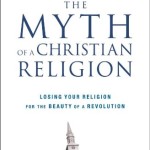We run our website the way we wished the whole internet worked: we provide high quality original content with no ads. We are funded solely by your direct support. Please consider supporting this project.
Must wives submit to husbands?
The apostle Paul writes:
Wives, be subject to your husbands as you are to the Lord. For the husband is the head of the wife just as Christ is the head of the church, the body of which he is the Savior. Just as the church is subject to Christ, so also wives ought to be, in everything, to their husbands. (Eph. 5:22–24)
Along similar lines, Peter writes:
Wives…accept the authority of your husbands….It was in this way long ago that the holy women who hoped in God used to adorn themselves by accepting the authority of their husbands. Thus Sarah obeyed Abraham and called him lord. You have become her daughters as long as you do what is good and never let fears alarm you. (1 Pet. 3:1, 5–6)
Many evangelicals (labeled complementarians) maintain that these words are as applicable today as they were in the first century. Male headship is part of God’s timeless design for creation. I do not see it this way, however.
Throughout the Bible God works with fallen cultures as he finds them to transform them from the inside out. I see the almost universal tendency for males to be positioned over women as part of our fallenness, and thus something God wants to move us out of. After the fall the Lord said the woman would desire the man and the man would rule over her (Gen. 3:16). The word “desire” in this passage has the connotation of “control.” The passage is declarative, not imperative, which means the Lord is here describing the way things are going to be, because of the fall, not the way he’d like them to be. The Lord is woefully saying that, because of the fall, the man and woman would now be involved in a power struggle and that, undoubtedly because of his tendency to be stronger, the man would tend to win.
I thus see the passages telling wives to submit to their husbands as being on a par with Paul’s instruction to Philemon to take back his slave Onesimus (Philem. 12–16). Though God’s desire was to do away with slavery, in this culture, at this time, the most he could do was “Christianize” it, as it were. Hence, God transformed the master-slave relationship by having Paul command the one who holds the power (Philemon) to use it in a Christlike way.
In the same way, I argue, God’s desire was to do away with gender-based authority and replace it with gift-based authority. But in this culture, at this time, the most he could do was “Christianize” the gender-based authority. Hence, Paul tells the one in power (the husband) to use his power in a Christlike way. He is to subject himself to his wife (Eph. 5:21) and be willing to give himself sacrificially for his wife, even as Christ did for the church (5:25–28). As with all relationships among believers, husbands and wives should not be concerned with who is the boss but should rather seek to serve and defer to one another (Luke 22:24–27; Phil. 2:5–8). While marriages afflicted by the fall are characterized by the husband and wife fighting to rule, marriages in Christ are to be characterized by the husband and wife coming under one another in loving service (Eph 5:21).
If a husband yet insists on being head of his wife, however, Paul’s teaching clearly rules out the carnal idea that this headship is about getting “the tie-breaker vote.” In Eph. 5, headship is actually about the opposite of this. The one who holds the power to rule (the husband) should imitate Jesus and use his power to initiate self-sacrificial service to his wife. While the husband and wife are to submit to each other (vs.21), the man who believes himself to be the head should be the one to take responsibility to defer to his wife first.
Further Reading
- Bilezikian, Gilbert. Beyond Sex Roles: A Guide for the Study of Female Roles in the Bible. Grand Rapids: Baker, 1985. (egalitarian)
- Clark, Stephen B. Man and Woman in Christ: An Examination of the Roles of Men and Women in Light of Scripture and the Social Sciences. Ann Arbor, Mich.: Servant, 1980. (complementarian)
- Foh, Susan T. Women and the Word of God: A Response to Biblical Feminism. Phillipsburg, N.J.: Presbyterian and Reformed, 1979. (complementarian)
- Groothuis, Rebecca M. Good News for Women: A Biblical Picture of Gender Equality. Grand Rapids: Baker, 1997. (egalitarian)
- Hull, Gretchen Gaebelein. Equal to Serve. Tarrytown, N.Y: Revell, 1991. (egalitarian)
- Hurley, James B. Man and Woman in Biblical Perspective. Downers Grove, Ill.: InterVarsity Press, 1981. (complementarian)
- Jewett, Paul K. Man as Male and Female: A Study in Sexual Relationships from a Theological Point of View. Grand Rapids: Eerdmans, 1975. (egalitarian)
- Kassian, Mary. Women, Creation, and the Fall. Westchester, Ill.: Crossway, 1990. (complementarian)
- Keener, Craig S. Paul, Women, and Wives: Marriage and Women’s Ministry in the Letters of Paul. Peabody, Mass.: Hendrickson, 1992. (egalitarian)
- MacArthur, John A. Different by Design. Wheaton: Victor Books, 1994. (complementarian)
- Neuer, Werner. Man and Woman in Christian Perspective. Translated by Gordon Wenham. Wheaton: Crossway, 1990. (complementarian)
- Piper, John, and Wayne Grudem, eds. Recovering Biblical Manhood and Womanhood: A Response to Evangelical Feminism. Wheaton: Crossway, 199 1. (complementarian)
Category: Essays
Tags: Christian Life, Essay, Marriage, Relationships
Topics: Relationships
Related Reading

Quotes to Chew On: The Church vs. Religion
“It’s time for the Church to free itself from the religious holiness of the Pharisees and begin to manifest the holiness of the Kingdom. It’s time for us to realize that our calling is to serve people sacrificially–including prostitutes, tax collectors, and enemies–rather than judging them. It’s time we ceased getting Life from the rightness…

What did Jesus mean when he said he came not to bring peace, but a sword (Mt 10:34)?
Given Jesus’ uniform teaching about loving enemies and abstaining from violence, and given that his followers were known for their refusal to engage in violence for the first three hundred years of church history, it’s obvious that Jesus wasn’t saying he came so that his disciples would use swords. The context of Jesus’ comment makes…

Podcast: Dear Greg: What Should I Do If My Husband Wants a Divorce Due To His Desire to Live as a Gay Man?
God is a God of broken covenants. Greg considers broken covenants and what to do in the rubble of one. http://traffic.libsyn.com/askgregboyd/Episode_0279.mp3

The REAL Problem with Divine Violence in the OT
As I mentioned in my previous blog, while I will continue to offer video-blogs responding to questions that come in, I’m also planning on sprinkling in reflections based on my forthcoming book, Crucifixion of the Warrior God, over the next couple months. Today, I just want to state what I consider to be the real…

Is Jesus Unique?
The Search for a Non-Unique Jesus Built into the naturalistic assumption that drives the liberal New Testament search for the “man behind the myth” is the notion that, whoever Jesus was, he cannot have been utterly unique. The laws that operate in the world today, including the laws of human behavior, have always operated. And…

How Details in the Gospels Support Their Historicity
*This essay is adapted from G. Boyd & P. Eddy, Lord or Legend? (Baker, 2007). For a fuller discussion, see P. Eddy & G. Boyd, The Jesus Legend (Baker, 2007). There are a number of questions historians ask when they are trying to assess the historical value of an ancient document that claims to report…
